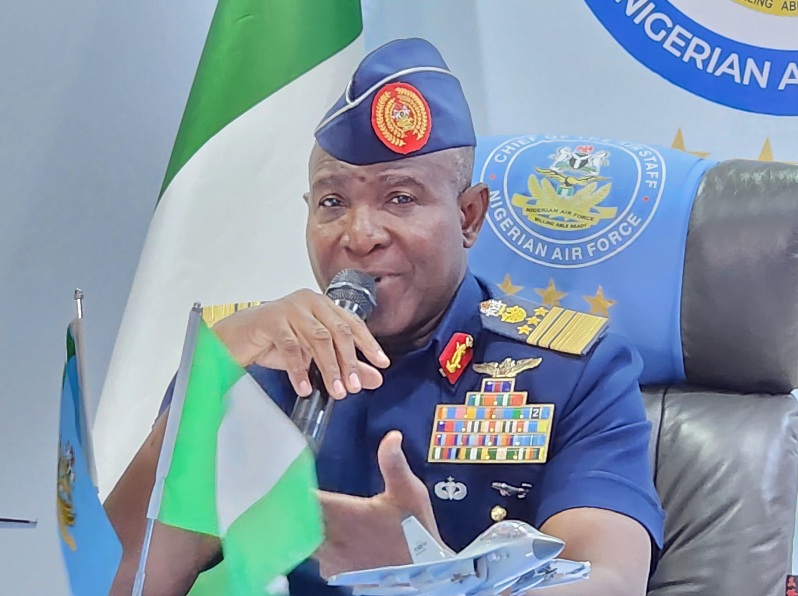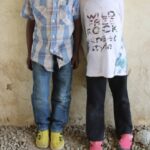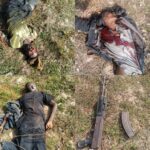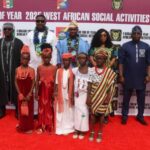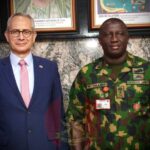By Augustine Ehikioya
With improved work by its Research and Development Unit, the Nigerian Air Force (NAF) is putting the finishing touches to Nigeria’s locally produced aircraft.
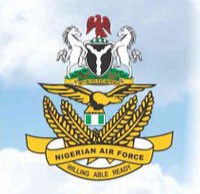
Noting that the aircraft were being produced in Nigeria in partnership with a foreign firm, the Chief of Air Staff (CAS), Air Marshal Hasan Bala Abubakar, assured that the aircraft would hit the skies before the end of the current year.
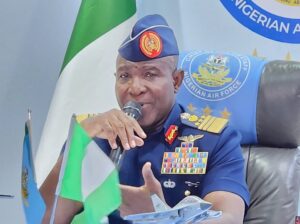
He gave the assurance in Abuja during the Media Executives Chat in commemoration of NAF’s 61st anniversary.
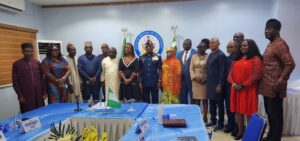
He said “The fact is that we have a lot of capacity, it’s just harnessing it that is our challenge and we will be able to make a lot of breakthroughs in terms of really being self-sufficient.
“So, for us, that is why we are really focusing on research and development and these efforts have begun to pay dividends. A lot of products have come out of our research and development activities.
That’s why we do it annually at the Nigerian Air Force, R and D Competition, just to encourage units, formations, and even individuals to engage in research and development.
“We have been able to produce a lot of products. A lot of them have been deployed in operation areas, supporting our aircraft. Some have only military use, some are for dual use. The ones that are for either dual or civilian use have been patented by the National Office for Technology, Acquisition and Promotion.
“I think so far, we have about six products that have been patented by that body as a result of R & D. What we are looking for is just mass production and commercialisation eventually.”
The Chief of Air Staff went on “I think the last time, I also spoke about UAV, which was designed, built and even test-flown purely by Nigerian Air Force engineers and technicians. Of course, no man is an island. No country in the world manufactures aircraft from A to Z completely.
“So, that’s how our strategic partnership comes in as one of my key enablers. We had to partner with a company in Portugal to put the finishing touches, particularly in terms of the avionics, that’s communications and navigation systems for the UAV.
“Hopefully, we will see that UAV flying before the end of the year, essentially, indigenously produced, operated in Nigeria, of course, with the collaboration with this company from Portugal” he stated.
Harping on the importance of producing such locally, he noted that, due to political and other reasons, a nation can even be denied Aviation products, irrespective of whether the country has paid for it or not.
He said “Aviation, generally, or let me say the Airforce, in this case, is very highly technical. For our training, technical and spare parts consumables, the assets themselves, and everything, we do not produce here. We have to look for it from foreign vendors. This is very expensive in terms of foreign exchange for the government.
“Also, you may even have the money to buy, but for political and other considerations, the vendor may just deny you. It is a very big problem for us and the only way forward, the only solution we see is for us to develop capacity so that we begin to get ourselves off this total dependence for our defence needs on foreign vendors.
“The only way to win ourselves is through research and development in engineering so that we can begin to produce some of these things,” he stated.
According to him, the Nigerian Air Force has also made progress in the production of armament technology.
“We are on the verge of creating our own production, particularly the C5 57 millimetre rocket. We went into partnership with also a company in Serbia, to transfer the technology and also establish a production line in Nigeria for that.”
He explained that once the capacity is acquired, it will be easy to do other types.
“This is a very huge and important milestone for us as far as armament technology is concerned,” he said.
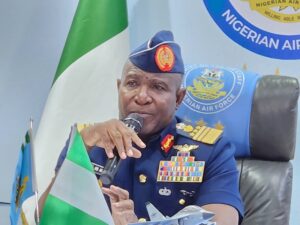
Noting that personnel is the most important asset any organisation can have, the Chief of Air Staff said many packages have been put in place to improve the welfare of Nigerian Air Force personnel.
He said “We have realised that human being is the most important asset that any organisation can have. So you can have all the expensive aeroplanes, and weapon systems, name it, if the human being is not properly motivated to be able to operate, you are unlikely to succeed.
“And even with very rudimentary systems, if the human being operating them is not adequately motivated, then you are unlikely to achieve a lot of your aims and objectives.
“So of course, that is why we focus a lot also on the welfare of our personnel, to make sure that they’re adequately motivated to be able to carry out their jobs most effectively, most efficiently.
“We have ensured that some of the challenges regarding accommodation, uniforms and other accoutrements have been significantly addressed. It’s a work in progress. Some of the challenges have been there over time, but we are addressing them head-on, and we have made a lot of progress.”
The CAS added “But one other area that I think has had very significant impacts in terms of increasing the welfare of our personnel is our establishment of the microfinance bank, Nigerian Air Force Microfinance Bank, that is supposed to encourage investments, encourage individuals to save and also provide very cheap interest loans, not only for the personnel but also for their families, wives, children.
“So it’s a very good avenue, and personnel are really taking advantage of it, and it’s making a lot of positive impact in their lives.”
“I’ve also made a lot of investments in terms of our schools, our hospitals, accommodation and many other barrack infrastructure, electricity, water, roads, office buildings, just to make sure that our personnel do not have any worries and are able to focus on the job at hand, the job that we have asked them to do, and they’re able to do it very well, and they were seeing a lot of improvement as far as the welfare and morale of our personnel is concerned.
“We are also able to establish an insurance policy. In the past, we had an insurance policy only for pilots, you know, that flew our aeroplanes. But the fact is that in terms of optimising our force structure, we realise that there are a lot of injuries or sicknesses arising from the workplace.
“When he has a very robust insurance policy to fall back on, and so therefore, the individual can focus more on the job at hand. These are just a few of the welfare initiatives that we have implemented, amongst so many others,” he stated.
Speaking further on NAF’s 61st anniversary, he said the Nigerian Air Force has become the third-largest Air Force on the African continent.
Stressing that the NAF is not resting on its oars, he said it is on the way to the first or second position.
He said “The Nigerian Air Force just turned 61. We have lined up a series of very formidable activities to commemorate this milestone. A lot of activities regarding civil-military relations, aerial fly past, aerial displays, research and development, competitions, and many other activities that are lined up to commemorate this important milestone.
“As a service, I will say that we have every reason to be proud, to be thankful to God and to be happy and to celebrate, looking at where we are coming from. When the Air Force was established in 1964 by an act of parliament, and we started as a very small arm of the armed forces, a very tactical Air Force. It was capable of very limited activities, specifically tactical troop transport, you know, within the theatres of operation.
“And going through a lot of transformation to where we are today, to an air force that is capable of carrying out operations with strategic effects far beyond even the borders of Nigeria, and also having a lot of additional capabilities in terms of assets, weapon systems, skills and experience.
“So we have every reason to be very proud of our achievements. Also. We are now the third largest air force on the African continent, and we’re on our way to probably becoming the second and maybe even the first eventually, due to our size, our capabilities and the array of assets that we have in our inventory.” he stated.
The CAS commended the media for its remarkable role over the years.



